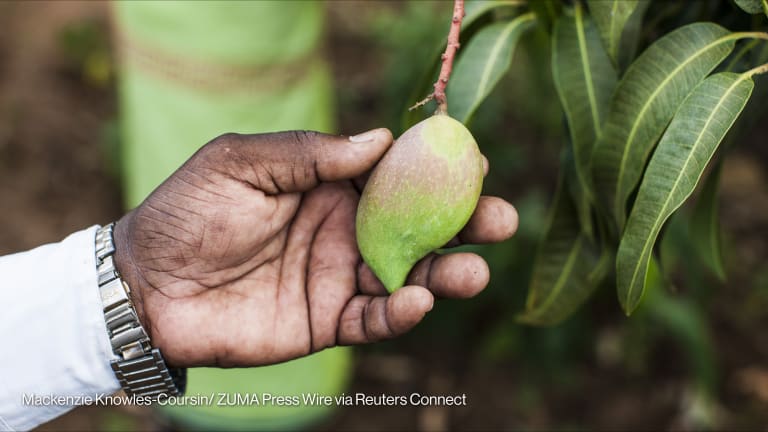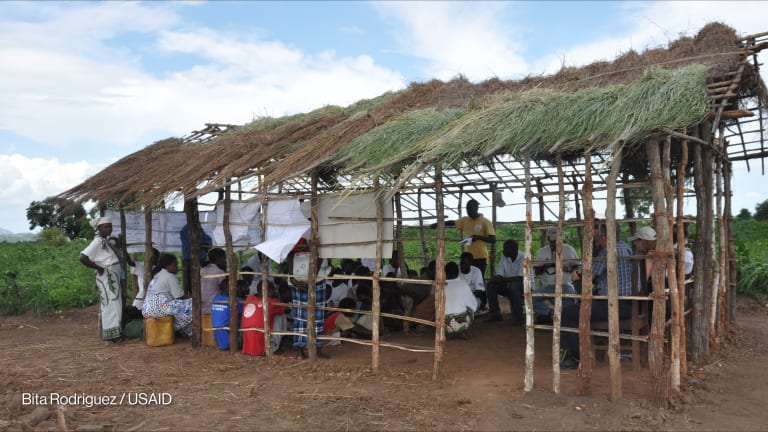How USAID's $5B investment in Feed the Future will be spent
The U.S. Agency for International Development will focus its nutrition investments on large-scale food fortification, supporting small- and medium-sized enterprises, and reducing food loss and waste.
The United States was the only government to announce a significant financial commitment at the United Nations Food Systems Summit in September: $5 billion will go toward eliminating global hunger. Shawn Baker, chief nutritionist at the U.S. Agency for International Development, sat down with Devex to discuss nutrition-specific investments, which include large-scale food fortification, support for small and medium-sized enterprises, and addressing food loss and waste. The funds will be spent through Feed the Future, the U.S. government’s global food security initiative, which currently operates in 12 countries. USAID will spend $38 million to expand large-scale food fortification to address ongoing deficiencies in essential vitamins and minerals, Baker said. “[We’re] really taking advantage of the Food Systems Summit to reposition large-scale food fortification as an evidence base acting at scale,” said Baker, who previously served as director of nutrition at the Bill & Melinda Gates Foundation. “Food fortification doesn’t require behavior change because we bring the nutrients to what people are already eating,” he added. “But having consumers’ voices at the table saying this is important ... [encourages] the private sector and the government to continue food fortification at high quality.” Baker said food fortification could improve nutrition levels in the short term, particularly during the COVID-19 pandemic when hunger has been on the rise. According to the revised U.S. Global Food Security Strategy, which was released last month and details the next five years of Feed the Future, the pandemic has reversed some of the initiative’s gains. Part of the $5 billion will go toward expanding Feed the Future to additional countries, which Baker said had not yet been identified. Further support for small- and medium-sized enterprises will also help make nutritious food more affordable around the world, he said. As part of the funding, USAID signed a memorandum of understanding with the U.S. International Development Finance Corporation and the Eleanor Crooke Foundation to close the funding gap that such businesses face in developing and selling nutritious foods. They aim to mobilize $100 million over five years to address the root causes of malnutrition. Baker said that USAID and ECF funds are “seed money,” and USAID hasn’t been traditionally strong at mobilizing additional money for such projects. “We see this as really a challenge to bring other investors to the table. We’re really trying to make sure that we make this attractive to other investors,” Baker said. “We have an overarching issue of how can we make safe, nutritious foods more affordable. And this is an area where we think we can bring in these small- and medium-sized enterprises, who are the backbone of the food system in so many counties, to have them be part of the solution.” On the issue of food loss and waste, Baker said the majority of Feed the Future countries experience the issue on the loss side, meaning food spoils before it even reaches the consumer. According to the Food and Agriculture Organization’s estimates, 14% of the world’s food is lost post-harvest, but before it reaches store shelves Reducing food loss could reduce the overall cost of food, Baker said, which makes it more accessible. It also reduces the environmental impact of the food system. “We really want to reassert U.S. leadership in nutrition and, as importantly, to galvanize other stakeholders and partner governments ... to really step up and make bold commitments.” --— Shawn Baker, chief nutritionist, U.S. Agency for International Development A research grant of $25 million to Tufts University will support a new Feed the Future Innovation Lab for Food Systems for Nutrition that will build on the existing Feed the Future Innovation Lab for Nutrition hosted by the school. There is the possibility of another $15 million in funding. He said the research agenda can help identify solutions — whether they be technological, behavioral, or regulatory. “What are the biggest levers of food loss — and to a certain extent food waste but particularly food loss — how do you prioritize them, and then home in on a set of actions that are high priority, high impact,” Baker said. “Where is this loss coming from? What’s actionable? What do we know that’s actionable? What do we still need to research?” Baker said the Food Systems Summit commitments made by the U.S. are closely tied to efforts to generate greater action at next month’s Nutrition for Growth Summit, being hosted virtually by the Japanese government. The event was originally scheduled for last year, but COVID-19 has made it even more timely, Baker said, as projections predict 13.6 million more children wasted and 3.6 million more children stunted because of the pandemic. “The Food Systems Summit has really helped amplify nutrition, particularly when it comes to food systems, and keeping that momentum into Nutrition for Growth is incredibly important,” Baker said. “The Nutrition for Growth summit is more important now than ever. And we really want to reassert U.S. leadership in nutrition and, as importantly, to galvanize other stakeholders and partner governments, development banks, other donors, businesses, to really step up and make bold commitments, both policy and financial commitments, so that we can arrest this backsliding and get back on track.” Nutrition for Growth is mobilizing commitments around the three pillars of healthy diets, nutrition, and universal health care and nutrition in humanitarian and fragile settings. USAID missions around the world that have nutrition programs have been working with their host governments and partners to encourage them to come to the December event ready to make announcements. “We see it obviously very important that we bring our own commitments to table — policy and financial commitments — but that we use our voice to really encourage others to come to the table with commitments,” Baker said. “It’s a moment that I think we're really trying to put as much energy into as possible to really galvanize action across the board.”
The United States was the only government to announce a significant financial commitment at the United Nations Food Systems Summit in September: $5 billion will go toward eliminating global hunger.
Shawn Baker, chief nutritionist at the U.S. Agency for International Development, sat down with Devex to discuss nutrition-specific investments, which include large-scale food fortification, support for small and medium-sized enterprises, and addressing food loss and waste. The funds will be spent through Feed the Future, the U.S. government’s global food security initiative, which currently operates in 12 countries.
USAID will spend $38 million to expand large-scale food fortification to address ongoing deficiencies in essential vitamins and minerals, Baker said.
This story is forDevex Promembers
Unlock this story now with a 15-day free trial of Devex Pro.
With a Devex Pro subscription you'll get access to deeper analysis and exclusive insights from our reporters and analysts.
Start my free trialRequest a group subscription Printing articles to share with others is a breach of our terms and conditions and copyright policy. Please use the sharing options on the left side of the article. Devex Pro members may share up to 10 articles per month using the Pro share tool ( ).
Teresa Welsh is a Senior Reporter at Devex. She has reported from more than 10 countries and is currently based in Washington, D.C. Her coverage focuses on Latin America; U.S. foreign assistance policy; fragile states; food systems and nutrition; and refugees and migration. Prior to joining Devex, Teresa worked at McClatchy's Washington Bureau and covered foreign affairs for U.S. News and World Report. She was a reporter in Colombia, where she previously lived teaching English. Teresa earned bachelor of arts degrees in journalism and Latin American studies from the University of Wisconsin.








